English Literature Essay: Exploring Themes in Kafka and Wilde
VerifiedAdded on 2022/10/19
|5
|966
|176
Essay
AI Summary
This English Literature essay delves into the contrasting themes of alienation and love as depicted in Franz Kafka's "A Hunger Artist" and Oscar Wilde's "The Nightingale and the Rose." The essay explores the concept of egotism and the spiritual quest in Kafka's story, contrasting it with Wilde's portrayal of selfish and selfless love. The student argues for greater empathy with the nightingale, highlighting its selflessness and sacrifice as true representations of love, while critiquing the self-centeredness of other characters. The analysis includes character comparisons, thematic exploration, and a discussion of the characters' motivations within the context of the stories. The essay uses textual evidence and references scholarly works to support its arguments, providing a comprehensive analysis of the selected literary pieces and their underlying themes.
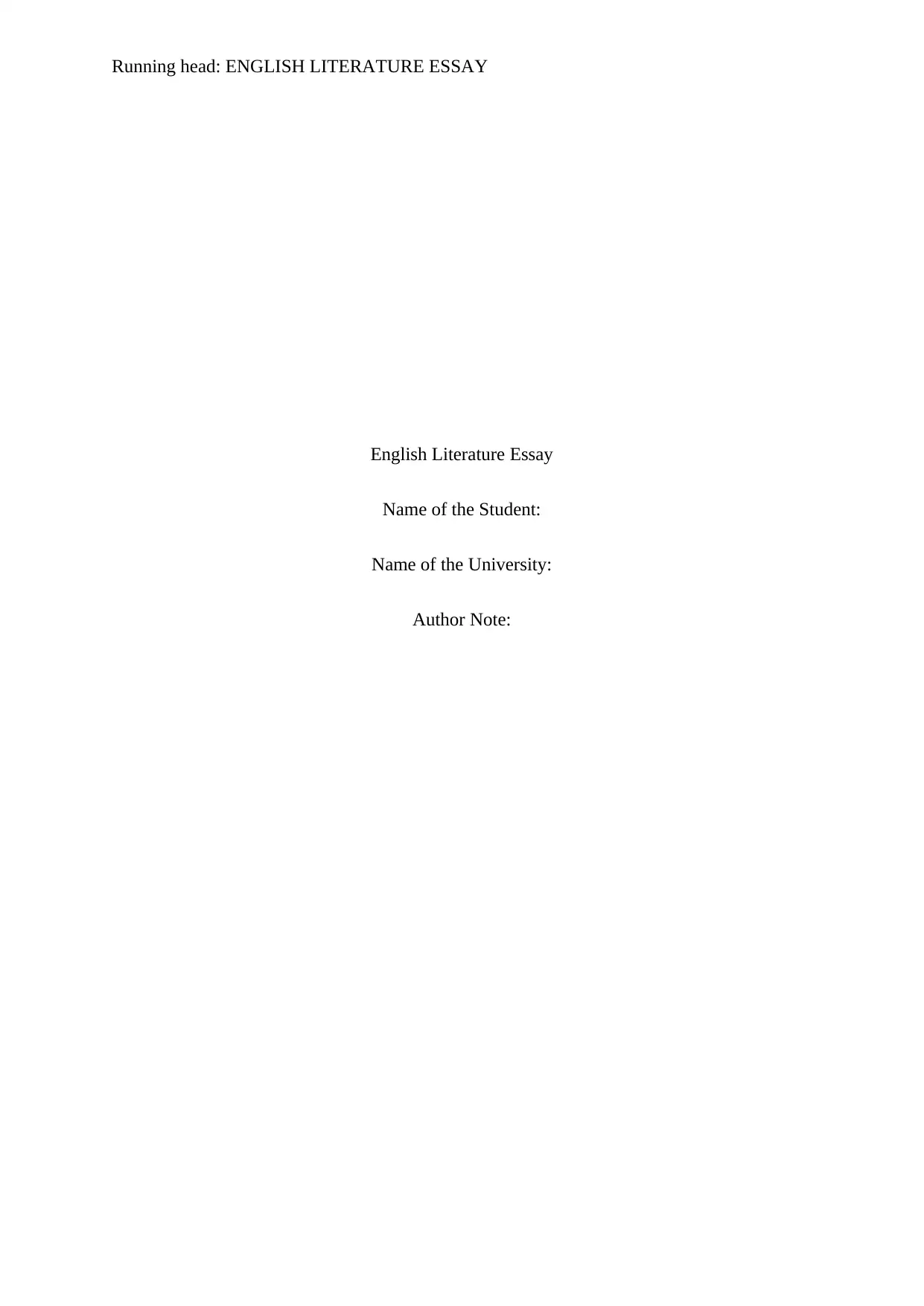
Running head: ENGLISH LITERATURE ESSAY
English Literature Essay
Name of the Student:
Name of the University:
Author Note:
English Literature Essay
Name of the Student:
Name of the University:
Author Note:
Paraphrase This Document
Need a fresh take? Get an instant paraphrase of this document with our AI Paraphraser
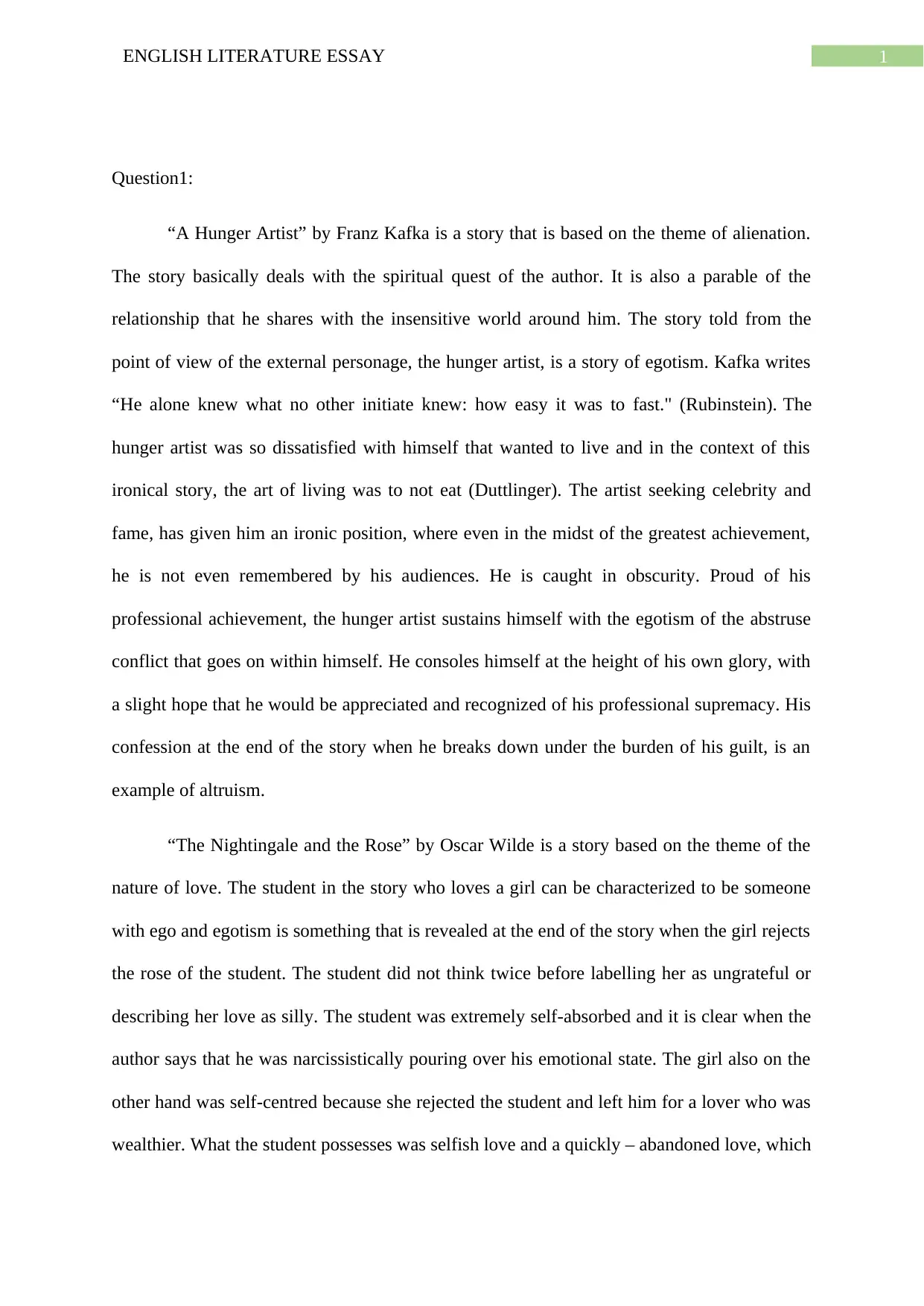
1ENGLISH LITERATURE ESSAY
Question1:
“A Hunger Artist” by Franz Kafka is a story that is based on the theme of alienation.
The story basically deals with the spiritual quest of the author. It is also a parable of the
relationship that he shares with the insensitive world around him. The story told from the
point of view of the external personage, the hunger artist, is a story of egotism. Kafka writes
“He alone knew what no other initiate knew: how easy it was to fast." (Rubinstein). The
hunger artist was so dissatisfied with himself that wanted to live and in the context of this
ironical story, the art of living was to not eat (Duttlinger). The artist seeking celebrity and
fame, has given him an ironic position, where even in the midst of the greatest achievement,
he is not even remembered by his audiences. He is caught in obscurity. Proud of his
professional achievement, the hunger artist sustains himself with the egotism of the abstruse
conflict that goes on within himself. He consoles himself at the height of his own glory, with
a slight hope that he would be appreciated and recognized of his professional supremacy. His
confession at the end of the story when he breaks down under the burden of his guilt, is an
example of altruism.
“The Nightingale and the Rose” by Oscar Wilde is a story based on the theme of the
nature of love. The student in the story who loves a girl can be characterized to be someone
with ego and egotism is something that is revealed at the end of the story when the girl rejects
the rose of the student. The student did not think twice before labelling her as ungrateful or
describing her love as silly. The student was extremely self-absorbed and it is clear when the
author says that he was narcissistically pouring over his emotional state. The girl also on the
other hand was self-centred because she rejected the student and left him for a lover who was
wealthier. What the student possesses was selfish love and a quickly – abandoned love, which
Question1:
“A Hunger Artist” by Franz Kafka is a story that is based on the theme of alienation.
The story basically deals with the spiritual quest of the author. It is also a parable of the
relationship that he shares with the insensitive world around him. The story told from the
point of view of the external personage, the hunger artist, is a story of egotism. Kafka writes
“He alone knew what no other initiate knew: how easy it was to fast." (Rubinstein). The
hunger artist was so dissatisfied with himself that wanted to live and in the context of this
ironical story, the art of living was to not eat (Duttlinger). The artist seeking celebrity and
fame, has given him an ironic position, where even in the midst of the greatest achievement,
he is not even remembered by his audiences. He is caught in obscurity. Proud of his
professional achievement, the hunger artist sustains himself with the egotism of the abstruse
conflict that goes on within himself. He consoles himself at the height of his own glory, with
a slight hope that he would be appreciated and recognized of his professional supremacy. His
confession at the end of the story when he breaks down under the burden of his guilt, is an
example of altruism.
“The Nightingale and the Rose” by Oscar Wilde is a story based on the theme of the
nature of love. The student in the story who loves a girl can be characterized to be someone
with ego and egotism is something that is revealed at the end of the story when the girl rejects
the rose of the student. The student did not think twice before labelling her as ungrateful or
describing her love as silly. The student was extremely self-absorbed and it is clear when the
author says that he was narcissistically pouring over his emotional state. The girl also on the
other hand was self-centred because she rejected the student and left him for a lover who was
wealthier. What the student possesses was selfish love and a quickly – abandoned love, which
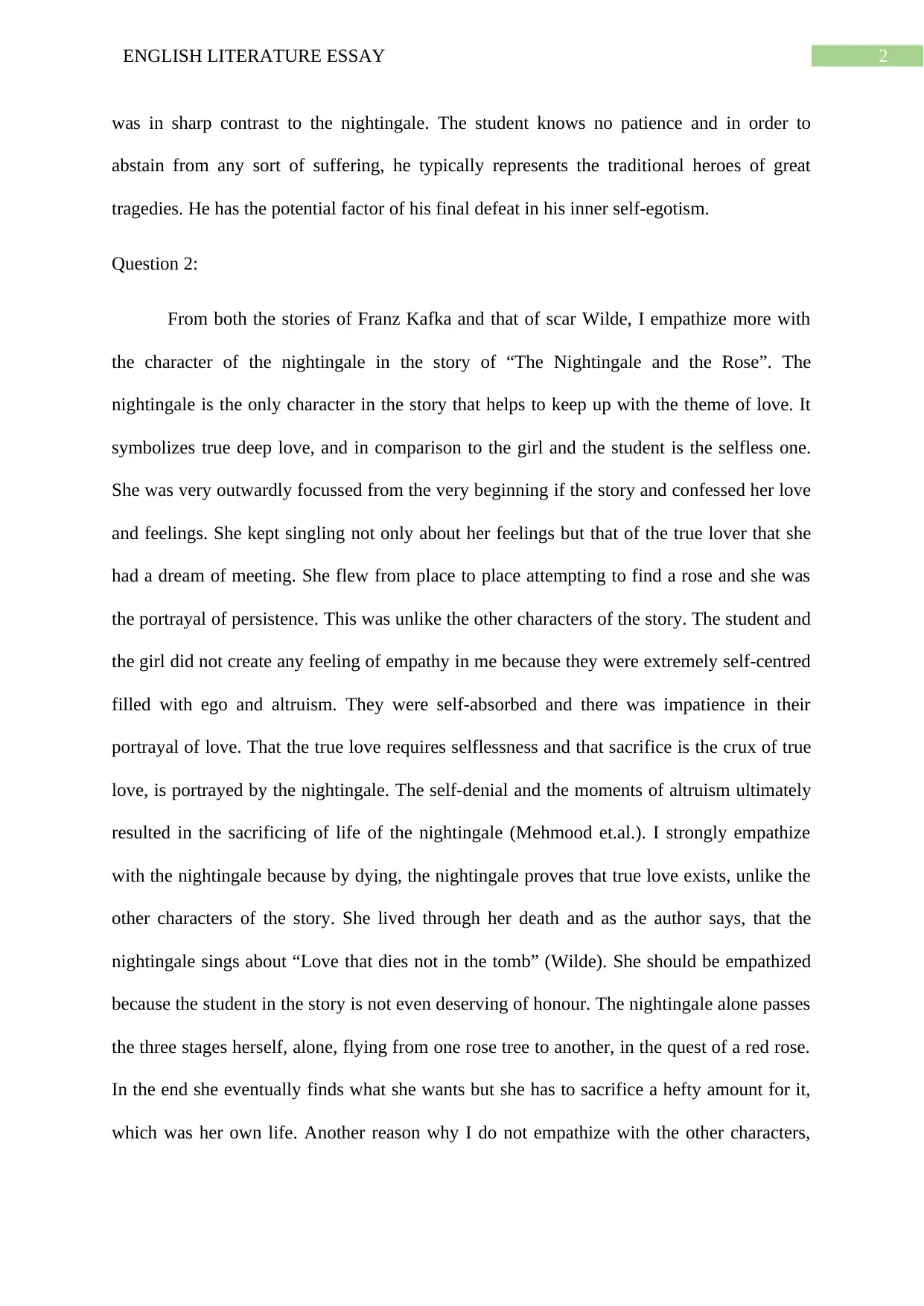
2ENGLISH LITERATURE ESSAY
was in sharp contrast to the nightingale. The student knows no patience and in order to
abstain from any sort of suffering, he typically represents the traditional heroes of great
tragedies. He has the potential factor of his final defeat in his inner self-egotism.
Question 2:
From both the stories of Franz Kafka and that of scar Wilde, I empathize more with
the character of the nightingale in the story of “The Nightingale and the Rose”. The
nightingale is the only character in the story that helps to keep up with the theme of love. It
symbolizes true deep love, and in comparison to the girl and the student is the selfless one.
She was very outwardly focussed from the very beginning if the story and confessed her love
and feelings. She kept singling not only about her feelings but that of the true lover that she
had a dream of meeting. She flew from place to place attempting to find a rose and she was
the portrayal of persistence. This was unlike the other characters of the story. The student and
the girl did not create any feeling of empathy in me because they were extremely self-centred
filled with ego and altruism. They were self-absorbed and there was impatience in their
portrayal of love. That the true love requires selflessness and that sacrifice is the crux of true
love, is portrayed by the nightingale. The self-denial and the moments of altruism ultimately
resulted in the sacrificing of life of the nightingale (Mehmood et.al.). I strongly empathize
with the nightingale because by dying, the nightingale proves that true love exists, unlike the
other characters of the story. She lived through her death and as the author says, that the
nightingale sings about “Love that dies not in the tomb” (Wilde). She should be empathized
because the student in the story is not even deserving of honour. The nightingale alone passes
the three stages herself, alone, flying from one rose tree to another, in the quest of a red rose.
In the end she eventually finds what she wants but she has to sacrifice a hefty amount for it,
which was her own life. Another reason why I do not empathize with the other characters,
was in sharp contrast to the nightingale. The student knows no patience and in order to
abstain from any sort of suffering, he typically represents the traditional heroes of great
tragedies. He has the potential factor of his final defeat in his inner self-egotism.
Question 2:
From both the stories of Franz Kafka and that of scar Wilde, I empathize more with
the character of the nightingale in the story of “The Nightingale and the Rose”. The
nightingale is the only character in the story that helps to keep up with the theme of love. It
symbolizes true deep love, and in comparison to the girl and the student is the selfless one.
She was very outwardly focussed from the very beginning if the story and confessed her love
and feelings. She kept singling not only about her feelings but that of the true lover that she
had a dream of meeting. She flew from place to place attempting to find a rose and she was
the portrayal of persistence. This was unlike the other characters of the story. The student and
the girl did not create any feeling of empathy in me because they were extremely self-centred
filled with ego and altruism. They were self-absorbed and there was impatience in their
portrayal of love. That the true love requires selflessness and that sacrifice is the crux of true
love, is portrayed by the nightingale. The self-denial and the moments of altruism ultimately
resulted in the sacrificing of life of the nightingale (Mehmood et.al.). I strongly empathize
with the nightingale because by dying, the nightingale proves that true love exists, unlike the
other characters of the story. She lived through her death and as the author says, that the
nightingale sings about “Love that dies not in the tomb” (Wilde). She should be empathized
because the student in the story is not even deserving of honour. The nightingale alone passes
the three stages herself, alone, flying from one rose tree to another, in the quest of a red rose.
In the end she eventually finds what she wants but she has to sacrifice a hefty amount for it,
which was her own life. Another reason why I do not empathize with the other characters,
⊘ This is a preview!⊘
Do you want full access?
Subscribe today to unlock all pages.

Trusted by 1+ million students worldwide
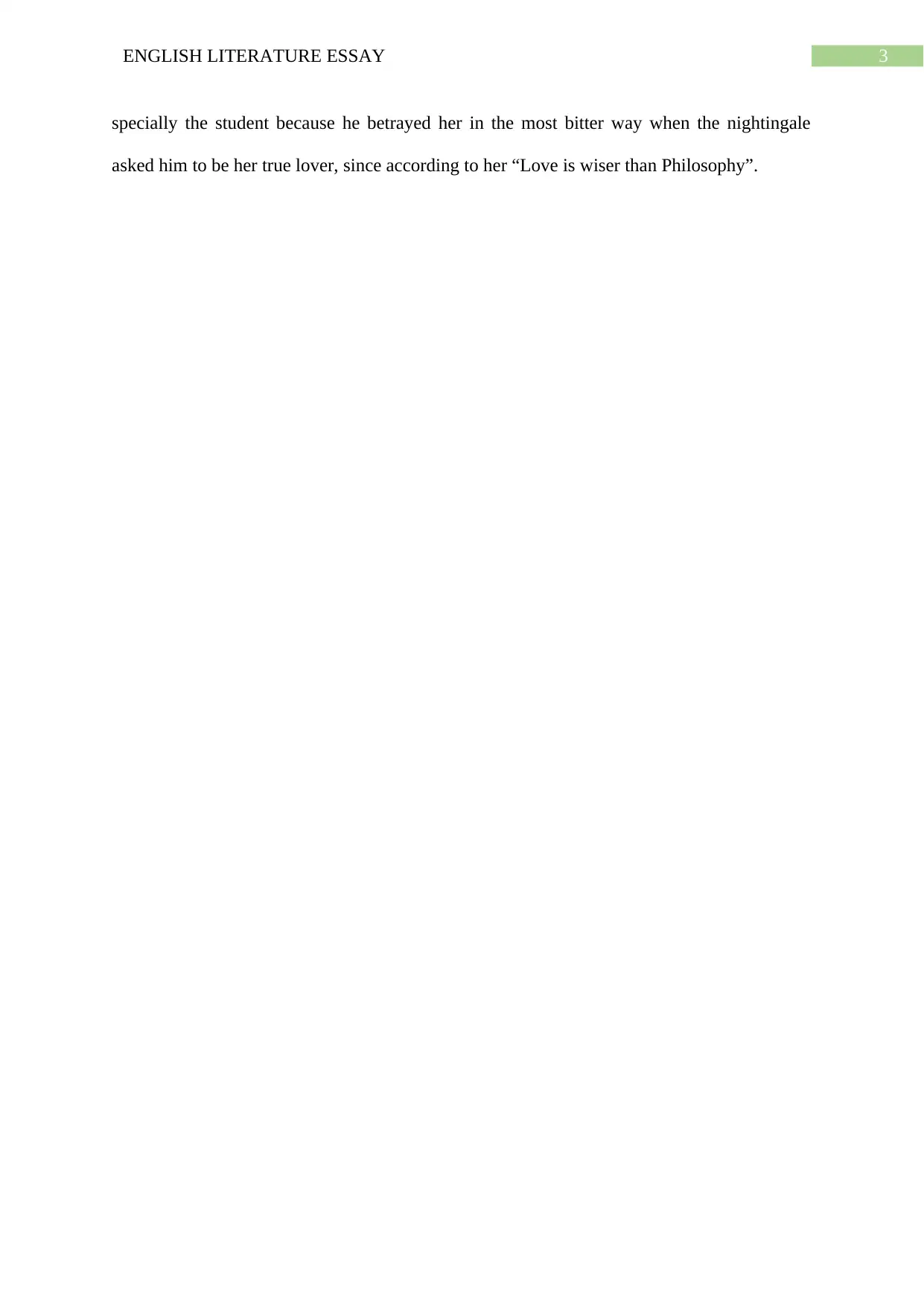
3ENGLISH LITERATURE ESSAY
specially the student because he betrayed her in the most bitter way when the nightingale
asked him to be her true lover, since according to her “Love is wiser than Philosophy”.
specially the student because he betrayed her in the most bitter way when the nightingale
asked him to be her true lover, since according to her “Love is wiser than Philosophy”.
Paraphrase This Document
Need a fresh take? Get an instant paraphrase of this document with our AI Paraphraser
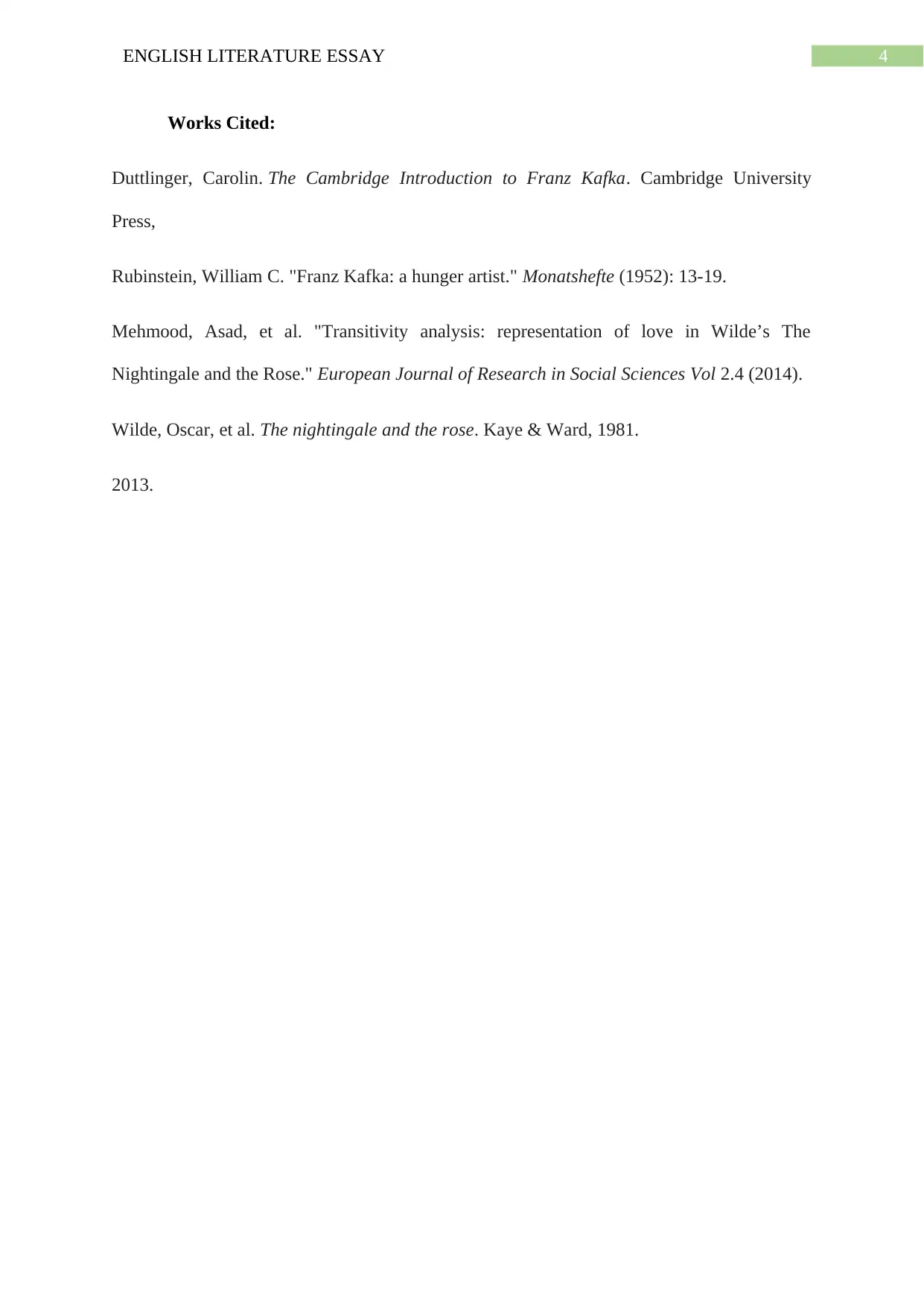
4ENGLISH LITERATURE ESSAY
Works Cited:
Duttlinger, Carolin. The Cambridge Introduction to Franz Kafka. Cambridge University
Press,
Rubinstein, William C. "Franz Kafka: a hunger artist." Monatshefte (1952): 13-19.
Mehmood, Asad, et al. "Transitivity analysis: representation of love in Wilde’s The
Nightingale and the Rose." European Journal of Research in Social Sciences Vol 2.4 (2014).
Wilde, Oscar, et al. The nightingale and the rose. Kaye & Ward, 1981.
2013.
Works Cited:
Duttlinger, Carolin. The Cambridge Introduction to Franz Kafka. Cambridge University
Press,
Rubinstein, William C. "Franz Kafka: a hunger artist." Monatshefte (1952): 13-19.
Mehmood, Asad, et al. "Transitivity analysis: representation of love in Wilde’s The
Nightingale and the Rose." European Journal of Research in Social Sciences Vol 2.4 (2014).
Wilde, Oscar, et al. The nightingale and the rose. Kaye & Ward, 1981.
2013.
1 out of 5
Related Documents
Your All-in-One AI-Powered Toolkit for Academic Success.
+13062052269
info@desklib.com
Available 24*7 on WhatsApp / Email
![[object Object]](/_next/static/media/star-bottom.7253800d.svg)
Unlock your academic potential
Copyright © 2020–2026 A2Z Services. All Rights Reserved. Developed and managed by ZUCOL.





